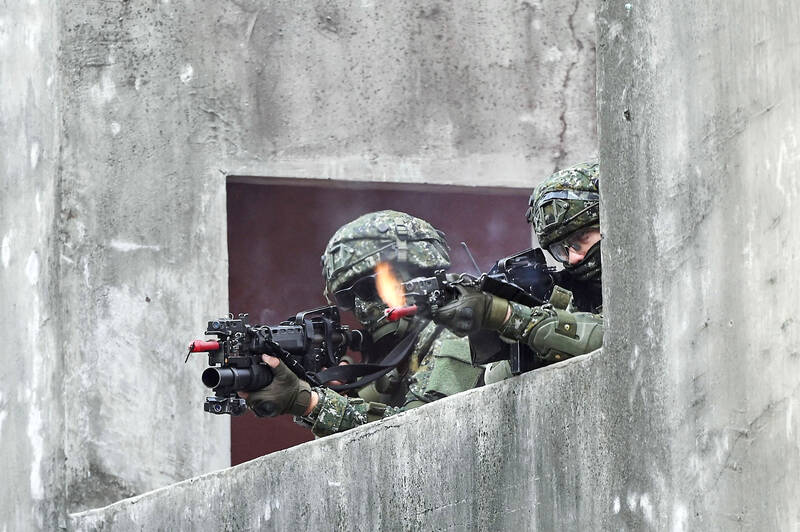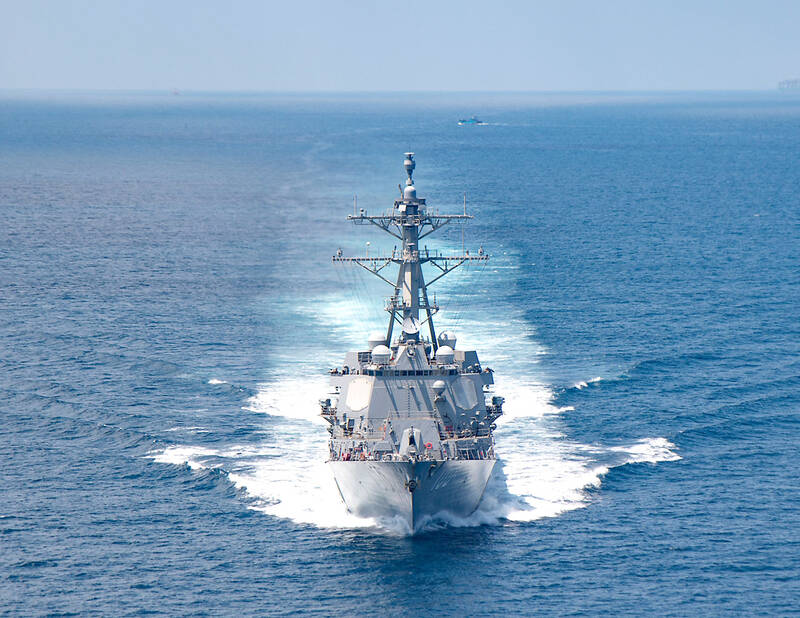Over the years, whole libraries of pro-People’s Republic of China (PRC) texts have been issued by commentators on “the Taiwan problem,” or the PRC’s desire to annex Taiwan.
These documents have a number of features in common. They isolate Taiwan from other areas and issues of PRC expansion. They blame Taiwan’s rhetoric or behavior for PRC actions, particularly pro-Taiwan leadership and behavior. They present the brutal authoritarian state across the Taiwan Strait as conciliatory and rational. Even their historical frames are PRC propaganda.
All of this, and more, colors the latest “analysis” and recommendations from the International Crisis Group, “The Widening Schism across the Taiwan Strait,” which summarizes its message thusly: “The new Taiwanese president has adopted a tougher stance on his country’s autonomy from China. Beijing, in turn, has amped up its pressure on the island.”

Photo: AFP
It recommends that Lai cool his verbiage, while Beijing reduce its military activities.
WHAT SCHISM?
The title signals its pro-PRC position. The idea of a “schism” implies that once there was unity, a pro-PRC framing. There is no “schism” to widen, because the issue is always the PRC’s murderous demand to annex Taiwan, and Taiwanese resistance to it. Nor has Taiwan ever been part of any Chinese state.

Photo: AFP
After casting Tsai as careful and placing Lai in opposition to her, the text states: “Starting in 2021, in response to increasing Chinese pressure, Tsai began to clarify her position further and used the phrase ‘the Republic of China and the People’s Republic of China should not be subordinate to each other,’ implying the two sides are separate, political entities.” That is exactly what Lai said in his inaugural speech.
The Crisis Group argues that Tsai always maintained that the Act Governing the People of the Mainland and Taiwan Areas (台灣地區與大陸地區人民關係條例) would govern her relations with the PRC. According to them, Lai dropped that in his inaugural, making his position more strident than hers.
This claim is nonsensical. Does anyone believe at this point that Tsai actually believed any of that? She was playing a game, as only a skilled bureaucrat can. Moreover, the Crisis Group has to concede the reality that Tsai’s position evolved in response to PRC pressure. What do they think Lai is doing? He is also responding to that increased pressure. Tsai’s “measured” approach, after all, brought no changes in PRC behavior. There is no reason to think that changes in Lai’s rhetoric will result in changes in PRC behavior, either. What should Lai do?
In fact, the Crisis Group affirms all this, but points out that the reason to return to Tsai’s measured approach is not to mollify the PRC, but because it won support from other nations. Yet other nations have moved closer to Taiwan and the US because they are increasingly perceiving a shared threat from the PRC. Do the writers of that document really imagine that sovereign nations altered their policies toward the PRC because Tsai was nice? Note that Lai’s allegedly more strident rhetoric has not cooled this trend.
The Crisis Group even contends that Chinese leader Xi Jinping (習近平) was more flexible prior to Lai’s inaugural, saying that Taiwan must recognize that “both sides of the Taiwan Strait are Chinese and one family.” This was not “vaguer language” as the Crisis Group claims. The key word there is not “family” but “Chinese.” Xi’s words are merely the bogus “1992 consensus” refashioned, more of the same old inflexibility. But by presenting this tired war threat as “flexible,” the document can then argue that Taiwan’s resistance is the cause of the PRC’s tension heightening.
STATUS QUO
The report then goes on to recommend that everyone return to the old status quo, a movement that is no longer possible because the size of the PRC military has destroyed the ability of the US navy to enforce the old status quo. It even states: “At the same time, Washington must also continue to reassure Beijing that the US remains committed to acting in accordance with its one China policy.”
This “reassuring” is never defined, because people who write about the one-China policy without defining it typically hope the US will hand over Taiwan to Beijing. But as readers know, the US one-China policy is that the PRC is a state on the Asian mainland, which Taiwan is not part of. How, then, could it be reassuring to Beijing to hear the US say this? The writer is counting on the ignorance of the reader to fill in the blanks with the hazy idea that the US position is that Taiwan is part of the PRC.
The danger of this and the many other pieces like it is not only its pro-PRC coloring, but the American rhetorical context into which such texts fit. On the one hand, there is the never-ending flow of pro-PRC effluent in the US-China discourse. On the other, there is the crowd that argues that Taiwan should be abandoned to its fate. Somewhere in between is the extreme center, which ostensibly argues that Taiwan should do more in its own defense, but actually implies that since it probably won’t, it would be morally acceptable to not defend Taiwan.
Ironically, like the extreme center crowd, the Crisis Group calls on Washington to press Taipei to do more in its own defense, but makes no concrete recommendations for US actions, such as pre-positioning weapons, making firm commitments to defend the island, increasing military training and other military cooperation, and so forth. The Crisis Group’s vague verbiage on US actions betrays the pro-PRC positioning of the writers — such moves would make it more difficult for the PRC to take Taiwan. Instead, the writers call on the US to reassure Beijing that it remains open to peaceful “unification” (has that move ever changed Beijing’s behavior?).
Indeed, the document shows how the Crisis Group’s position that Taiwan must tone down its rhetoric and the extreme center claim that Taiwan should do more in its own defense (or be abandoned) are simply parallel variants of the “it’s Taiwan’s fault” position. It’s the reinforcing effect of these two positions, which are seemingly orthogonal to each other, that is so dangerous.
As in all pro-PRC documents, Beijing is never tasked with making concrete reductions in its expansionism — indeed, the idea that the PRC is an expansionist state whose demand for Taiwan is part of a larger expansionist drive never appears in this document. Yet everyone making policy in Tokyo, Manila, Seoul and Washington must grapple with that fact.
“Peace in the Taiwan Strait,” say the writers, “has for decades rested on a concerted willingness among Washington, Beijing and Taipei to set aside and paper over long-standing differences related to Taiwan’s sovereignty.”
No, peace in the Taiwan Strait has not rested on “willingness” — with its implication that “unwillingness” (especially on Taiwan’s part, of course) will lead to war. It has rested on the US navy’s ability to crush the PRC in a general war. It is not a coincidence that as that ability has eroded, peace is increasingly seen as threatened.
Notes from Central Taiwan is a column written by long-term resident Michael Turton, who provides incisive commentary informed by three decades of living in and writing about his adoptive country. The views expressed here are his own.

A vaccine to fight dementia? It turns out there may already be one — shots that prevent painful shingles also appear to protect aging brains. A new study found shingles vaccination cut older adults’ risk of developing dementia over the next seven years by 20 percent. The research, published Wednesday in the journal Nature, is part of growing understanding about how many factors influence brain health as we age — and what we can do about it. “It’s a very robust finding,” said lead researcher Pascal Geldsetzer of Stanford University. And “women seem to benefit more,” important as they’re at higher risk of

March 31 to April 6 On May 13, 1950, National Taiwan University Hospital otolaryngologist Su You-peng (蘇友鵬) was summoned to the director’s office. He thought someone had complained about him practicing the violin at night, but when he entered the room, he knew something was terribly wrong. He saw several burly men who appeared to be government secret agents, and three other resident doctors: internist Hsu Chiang (許強), dermatologist Hu Pao-chen (胡寶珍) and ophthalmologist Hu Hsin-lin (胡鑫麟). They were handcuffed, herded onto two jeeps and taken to the Secrecy Bureau (保密局) for questioning. Su was still in his doctor’s robes at

Last week the Democratic Progressive Party (DPP) said that the budget cuts voted for by the China-aligned parties in the legislature, are intended to force the DPP to hike electricity rates. The public would then blame it for the rate hike. It’s fairly clear that the first part of that is correct. Slashing the budget of state-run Taiwan Power Co (Taipower, 台電) is a move intended to cause discontent with the DPP when electricity rates go up. Taipower’s debt, NT$422.9 billion (US$12.78 billion), is one of the numerous permanent crises created by the nation’s construction-industrial state and the developmentalist mentality it

Experts say that the devastating earthquake in Myanmar on Friday was likely the strongest to hit the country in decades, with disaster modeling suggesting thousands could be dead. Automatic assessments from the US Geological Survey (USGS) said the shallow 7.7-magnitude quake northwest of the central Myanmar city of Sagaing triggered a red alert for shaking-related fatalities and economic losses. “High casualties and extensive damage are probable and the disaster is likely widespread,” it said, locating the epicentre near the central Myanmar city of Mandalay, home to more than a million people. Myanmar’s ruling junta said on Saturday morning that the number killed had